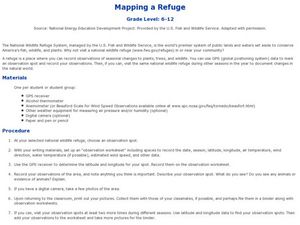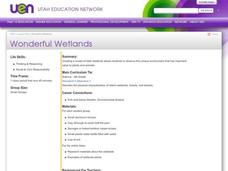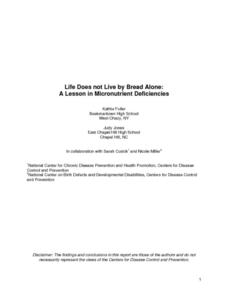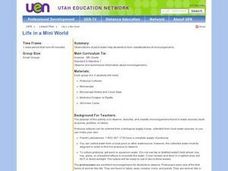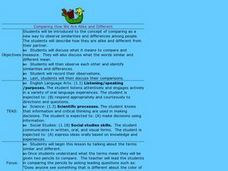Curated OER
Energy from the Sun
In this energy worksheet, learners conduct an experiment and observe the various ways in which heat energy can be transferred. They explain what happened to the wooden block when it was placed in direct sunlight. Students also explain...
Curated OER
What Holds a Substance Together?
Students observe how substances are held together by bonds. In this physics lesson, students demonstrate how a substance is held together by ripping newspapers and stretching marshmallows. Students complete a data sheet.
Curated OER
Take Only Photos and Leave Only Bubbles
Students make careful observations and record their observations. They communicate their findings with their peers and analyze data collected about a site. They determine what it means to be a looter, and feel the direct effects of...
Curated OER
Clouds Movement and Type
Students examine types of clouds and their movement. In this science lesson plan, students explore how to determine cloud movement and direction, differentiate between the different types of clouds, and predict the weather based on the...
Curated OER
Mapping a Refuge
Students record observations gathered while at a national wildlife refuge. In this lesson on wildlife refuges, students choose an observation spot and record seasonal changes throughout the year.
Curated OER
Biomechanics of Joints
Students examine the range of motion of your knee, wrist and shoulder and observe that these body parts act like different types of mechanical joints.
Curated OER
Wonderful Wetlands
Fourth graders create a model of Utah wetlands using clay, sponges and soil. They identify the value the wetlands have to plants and animals. They simulate rainfall to observe how wetlands help filter silt and pollutants from the water.
Curated OER
Life Does Not Live By Bread Alone
High schoolers investigate the relationship between micronutrients and proper metabolic function. The lesson plan should serve as an introduction to the subject. The subject of the function includes the study of plants, animals, and...
Curated OER
PROTOPLAST PRODUCTION
Students are allowed to strip away the cell walls of plants cells (using enzymes) and then observe the resulting spherical protoplasts (plant cells minus the cell wall). They see that plants cells indeed have a plasma membrane in...
Curated OER
A Tail to Tell
Students observe populations of Lumbriculus to discover some of the adaptations that allow them to live successfully along the shores of ponds and marshes. They also design and perform experiments to test proposed hypotheses for these...
Curated OER
Introduction to Neutraliization
Students explore acids and bases and the process of neutralization.T hey practice volume measurements and observe the neutralization of an acid
directly through bubble formation and indirectly through indicator color changes.
Curated OER
Reliability Of Your Visual Sense
Students explore visual sense. In this biology lesson plan, students perform a series of tests on the reliability of their visual sense, record their observations for each test, and conclude from their data how reliable their visual...
Curated OER
Migrating Monarchs and Trekking Timber wolves on the Internet
Students learn and observe the life cycle of a monarch butterfly. They explore how wolves maintain complex social structure through scent, communications, and postures.
Curated OER
THE DIVERSITY OF ARCHITECTURE: HOW HEALTHY IS MY NEIGHBORHOOD?
Students observe and investigate, on a walking tour, what elements create a healthy neighborhood. They examine the significance of the relationship of the built environment as well as the important details of architecture.
Curated OER
What Are Ecosystems?
Third graders recognize and examine ecosystems. They observe and describe habitats within ecosystems and observe and identify organisms with similar needs that compete for resources.
Curated OER
Geometric Solids
Fourth graders examine the properties of geometric solids. Given geometric figures, they brainstorm observations. In groups, 4th graders identify solids and discuss the physical properties. Each student creates a Venn diagram and...
Curated OER
Focus on Friction
The students learn about friction and forces through direct instruction and an investigation. They use measurement skills, observation skills, predicting, and drawing conclusions based on data collected during the investigation. Students...
Curated OER
Momentum
Students explore the concept of "transfer of momentum". In this physics lesson, students observe the results of two objects or people as they make contact in different ways. Students on roller blades and model cars of different weights...
Curated OER
Water Cycle
Third graders observe the changes that occur in the water cycle after doing a water cycle demonstration in a plastic bag. In this water cycle lesson plan, 3rd graders reflect on what they see and identify the stages.
Curated OER
Fascinating Factors
Learners observe biotic and abiotic things participating in an observational walk outside the school. They create a collage using pictures of biotic and abiotic items.
Curated OER
Life in a Mini World
Sixth graders observe, describe, and classify microorganisms found in water sources. In small groups, they make their own slide, observe the Protozoa under a microscope, and record and classify the microorganisms.
Curated OER
Creative Position Word Center Activity
Students use positional words to describe the location of objects and demonstrate the ability to follow multi-step oral directions. Seasonal shapes are decorated in relation to the directions and positions stated by the positional word.
Curated OER
Sequencing Activities In A Procedure
Seventh graders discuss the importance of following instructions without procrastination. They explore careers where following instructions can make a difference between life and death. Students identify important details in written...
Curated OER
Comparing How We Are Alike and Different
Students introduced to comparing as a way to observe differences among people.
Other popular searches
- Euglena Direct Observation
- Eugenia Direct Observation
- Euglenda Direct Observation
- Glenda Direct Observation
- What Is Direct Observation






